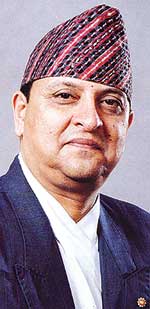 King Gyanendra used the word 'people' 25 times in the full text of the 2,300-word interview that appeared on the online version of the Time magazine last week. The thrust of the interview was contained in one sentence: "Stop saying 'me'. Say 'us.' Stop saying 'party'. Say 'people'."
King Gyanendra used the word 'people' 25 times in the full text of the 2,300-word interview that appeared on the online version of the Time magazine last week. The thrust of the interview was contained in one sentence: "Stop saying 'me'. Say 'us.' Stop saying 'party'. Say 'people'." He concludes the interview by saying: "If the people are happy, the king is happy. And my fear is that we might be heading for a ditch if the people, their grievances and their betterment are not thought of. I put myself in their shoes every night."
The interview probably leaves a positive impression on a reader not closely following Nepali politics. But for those of us involved in researching and analysing the Nepali political scene, it does not appear any different from what the Kangresis, Emales, Maoists and others have been saying. In short, the king is sounding like a politician.
King Gyanendra reiterates his desire to play a "constructive role". It may now be time for us to evaluate whether his role so far has been constructive or not. Independent commentators and scholars, within Nepal and outside, will do that, and history will judge if their assessment is correct.
But the real question is whether politics is the arena for a constitutional monarch to play a constructive role. Can a king address the suffering of the Nepali people by playing politics? Is politics the way to serve and speak on their behalf?
A constitutional king's role is to address the concerns of the people by being non-political, or by rising above politics. Not to be dragged into day-to-day controversy, but to remain above it. Let the politicians deal with politics, the monarch's role should be to be a role model for development, to set new standards for charity and relief that others can follow.
Adding luxury cars to the palace's fleet of limousines sends the wrong message at the wrong time. Approving a higher budget for the royal household when hundreds of thousands of Nepalis are grieving is inappropriate. An ideal move for King Gyanendra at the present time would be to set up a charitable trust in his brother's name and in memory of relatives slain on 1 June 2001, financed by their assets. But who is going to tell the king?
Royals in other countries have set examples by being patrons of charitable institutions and development causes. In a country devastated by war, with hundreds of thousands internally displaced, thousands orphaned and bereaved, such a royal role is even more urgently required. Once such an initiative is launched, there will be no shortage of philanthropists and charities inside and outside Nepal who will pour in counterpart funds for relief to support such a pious cause started by none other than the monarch himself.
Britain is a country which members of Nepal's royal family visit every year. It must have come to their notice that in Britain the members of the royal family raise hundreds of millions of pounds for charitable causes to make up for what the state spends on them. We in Nepal should have a foundation modeled on the 'Prince's Trust' which raises money for charitable causes that bring immediate relief to the disadvantaged.
By all accounts, King Gyanendra is an intelligent man. But intelligence may not be enough to change the course of history and redefine the role of the 21st century monarch as he wants to do.
That needs wisdom, statesmanship, social commitment and sincerity.
A lot of it is also about perception, and the public's perception should be of a monarch who is above rhetoric, who is not just playing politics. Our politicians have done that for too long.
The king and his family need to be involved in activities that directly benefit the people, and for once really put themselves in the people's shoes.
Robin Raj is a London-based researcher.



